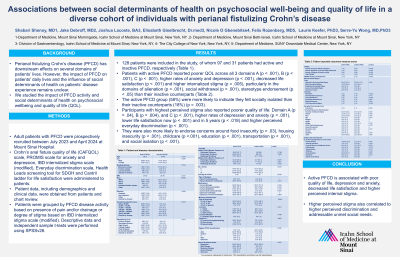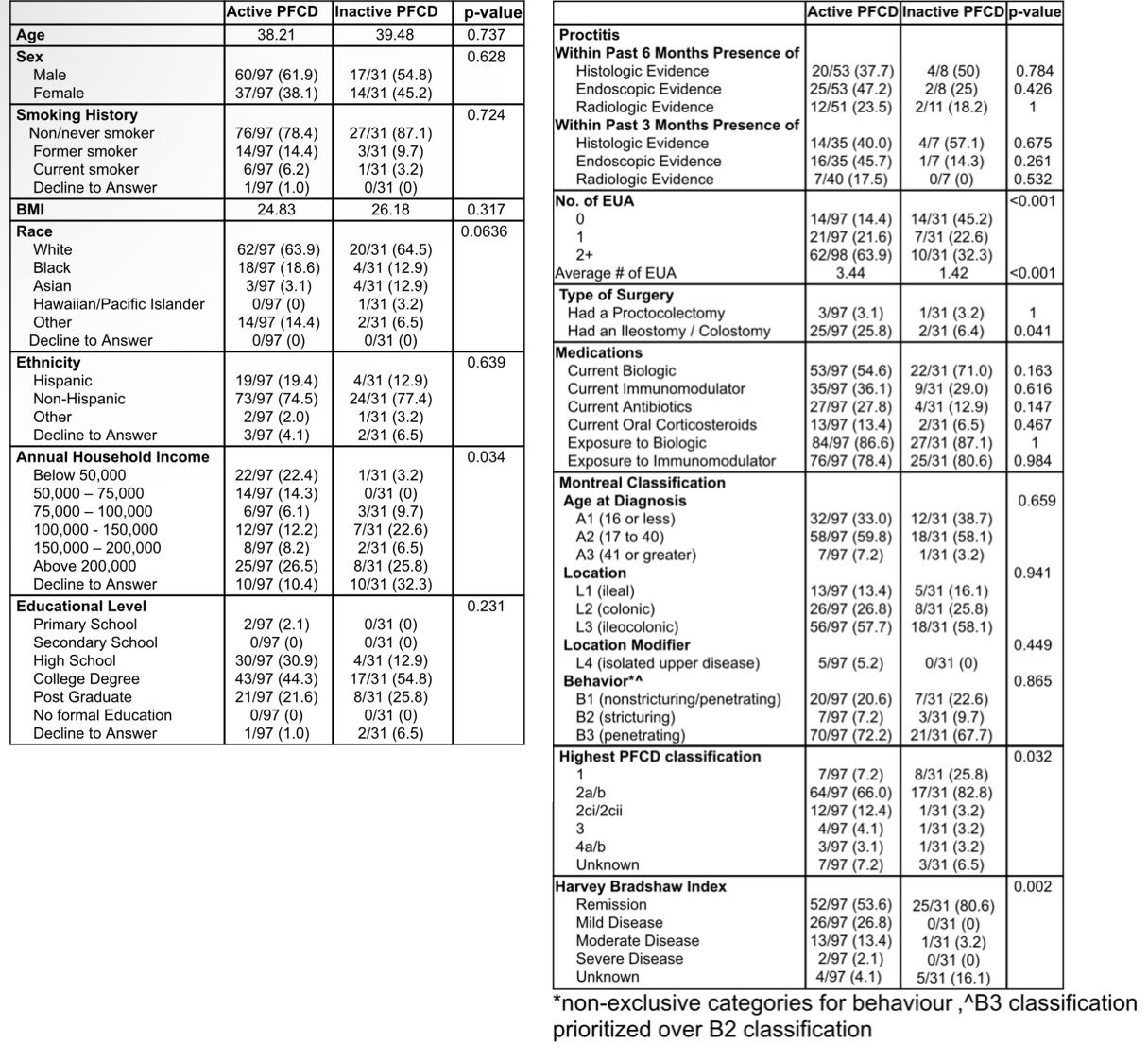Monday Poster Session
Category: IBD
P2592 - Associations Between Social Determinants of Health on Psychosocial Well-Being and Quality of Life in a Diverse Cohort of Individuals With Perianal Fistulizing Crohn’s Disease
Monday, October 28, 2024
10:30 AM - 4:00 PM ET
Location: Exhibit Hall E

Has Audio
- SS
Shabari Shenoy, MD
Mount Sinai Morningside, Icahn School of Medicine at Mount Sinai
New York, NY
Presenting Author(s)
Shabari Shenoy, MD1, Jake DeBroff, MD2, Joshua Lacoste, BA3, Elisabeth Giselbrecht, 3, Nicole O Gbenebitse, 4, Felix D. Rozenberg, MD5, Laurie Keefer, PhD3, Serre-yu Wong, MD, PhD3
1Mount Sinai Morningside, Icahn School of Medicine at Mount Sinai, New York, NY; 2Mount Sinai Beth Israel, Icahn School of Medicine at Mount Sinai, New York, NY; 3Icahn School of Medicine at Mount Sinai, New York, NY; 4City University of New York, New York, NY; 5SUNY Downstate Health Sciences University, Brooklyn, NY
Introduction: Perianal fistulizing Crohn’s disease (PFCD) has downstream effects on several domains of patients’ lives. However, the impact of PFCD on patients' daily lives and the influence of social determinants of health (SDH) on disease experience remains unclear. We studied the impact of PFCD activity and SDH on psychosocial wellbeing and quality of life (QOL).
Methods: Adult patients with PFCD were prospectively recruited between July 2023 and April 2024 at Mount Sinai Hospital. Crohn’s anal fistula quality of life (CAFQOL) scale, PROMIS scale for anxiety and depression, IBD Internalized Stigma Scale (modified), Everyday discrimination scale, Health Leads screening tool for SDH and Cantril ladder for life satisfaction were administered to patients. Patient data, including demographics and clinical data, were obtained from patients and chart review. Patients were grouped by PFCD disease activity based on presence of pain and/or drainage or degree of stigma based on IBD internalized stigma scale (modified). Descriptive data and independent sample t-tests were performed using SPSSv26.
Results: 128 patients were included in the study of whom 97 and 31 patients had active and inactive PFCD, respectively (figure 1). Patients with active PFCD reported poorer QOL across all 3 domains A (p< .001), B (p< .001), C (p< .001), higher rates of anxiety and depression (p<.001), decreased life satisfaction (p< .001) and higher internalized stigma (p=.005), particularly in the domains of alienation (p< .001), social withdrawal (p< .001), stereotype endorsement (p< .05) than their inactive counterparts (table1). The active PFCD group (58%) were more likely to indicate they felt socially isolated than their inactive counterparts (18%) (p=.003). Participants with highest perceived stigma also reported poorer quality of life: Domain A (p=.04), B (p=.004), and C (p< .001), higher rates of depression and anxiety (p< .001), lower life satisfaction now (p< .001) and in 5 years (p< .018) and higher perceived everyday discrimination (p <.001). They were also more likely to endorse concerns around food insecurity (p =.03), housing insecurity (p< .001), childcare (p< .001), education (p< .001), transportation (p< .001), and social isolation (p< .001).
Discussion: Active PFCD is associated with poor quality of life, depression and anxiety, decreased life satisfaction and higher perceived internal stigma. Higher perceived stigma also correlated to higher perceived discrimination and addressable unmet social needs.

Note: The table for this abstract can be viewed in the ePoster Gallery section of the ACG 2024 ePoster Site or in The American Journal of Gastroenterology's abstract supplement issue, both of which will be available starting October 27, 2024.
Disclosures:
Shabari Shenoy, MD1, Jake DeBroff, MD2, Joshua Lacoste, BA3, Elisabeth Giselbrecht, 3, Nicole O Gbenebitse, 4, Felix D. Rozenberg, MD5, Laurie Keefer, PhD3, Serre-yu Wong, MD, PhD3. P2592 - Associations Between Social Determinants of Health on Psychosocial Well-Being and Quality of Life in a Diverse Cohort of Individuals With Perianal Fistulizing Crohn’s Disease, ACG 2024 Annual Scientific Meeting Abstracts. Philadelphia, PA: American College of Gastroenterology.
1Mount Sinai Morningside, Icahn School of Medicine at Mount Sinai, New York, NY; 2Mount Sinai Beth Israel, Icahn School of Medicine at Mount Sinai, New York, NY; 3Icahn School of Medicine at Mount Sinai, New York, NY; 4City University of New York, New York, NY; 5SUNY Downstate Health Sciences University, Brooklyn, NY
Introduction: Perianal fistulizing Crohn’s disease (PFCD) has downstream effects on several domains of patients’ lives. However, the impact of PFCD on patients' daily lives and the influence of social determinants of health (SDH) on disease experience remains unclear. We studied the impact of PFCD activity and SDH on psychosocial wellbeing and quality of life (QOL).
Methods: Adult patients with PFCD were prospectively recruited between July 2023 and April 2024 at Mount Sinai Hospital. Crohn’s anal fistula quality of life (CAFQOL) scale, PROMIS scale for anxiety and depression, IBD Internalized Stigma Scale (modified), Everyday discrimination scale, Health Leads screening tool for SDH and Cantril ladder for life satisfaction were administered to patients. Patient data, including demographics and clinical data, were obtained from patients and chart review. Patients were grouped by PFCD disease activity based on presence of pain and/or drainage or degree of stigma based on IBD internalized stigma scale (modified). Descriptive data and independent sample t-tests were performed using SPSSv26.
Results: 128 patients were included in the study of whom 97 and 31 patients had active and inactive PFCD, respectively (figure 1). Patients with active PFCD reported poorer QOL across all 3 domains A (p< .001), B (p< .001), C (p< .001), higher rates of anxiety and depression (p<.001), decreased life satisfaction (p< .001) and higher internalized stigma (p=.005), particularly in the domains of alienation (p< .001), social withdrawal (p< .001), stereotype endorsement (p< .05) than their inactive counterparts (table1). The active PFCD group (58%) were more likely to indicate they felt socially isolated than their inactive counterparts (18%) (p=.003). Participants with highest perceived stigma also reported poorer quality of life: Domain A (p=.04), B (p=.004), and C (p< .001), higher rates of depression and anxiety (p< .001), lower life satisfaction now (p< .001) and in 5 years (p< .018) and higher perceived everyday discrimination (p <.001). They were also more likely to endorse concerns around food insecurity (p =.03), housing insecurity (p< .001), childcare (p< .001), education (p< .001), transportation (p< .001), and social isolation (p< .001).
Discussion: Active PFCD is associated with poor quality of life, depression and anxiety, decreased life satisfaction and higher perceived internal stigma. Higher perceived stigma also correlated to higher perceived discrimination and addressable unmet social needs.

Figure: Patient and disease characteristics
Note: The table for this abstract can be viewed in the ePoster Gallery section of the ACG 2024 ePoster Site or in The American Journal of Gastroenterology's abstract supplement issue, both of which will be available starting October 27, 2024.
Disclosures:
Shabari Shenoy indicated no relevant financial relationships.
Jake DeBroff indicated no relevant financial relationships.
Joshua Lacoste indicated no relevant financial relationships.
Elisabeth Giselbrecht indicated no relevant financial relationships.
Nicole O Gbenebitse indicated no relevant financial relationships.
Felix Rozenberg indicated no relevant financial relationships.
Laurie Keefer: ardelyx – Consultant, Grant/Research Support. coprata health\ – Advisory Committee/Board Member. pfizer – Consultant. trellus health – Consultant, Stock-publicly held company(excluding mutual/index funds).
Serre-yu Wong: BMS – Advisory Committee/Board Member. Takeda/Trinetx – Grant/Research Support.
Shabari Shenoy, MD1, Jake DeBroff, MD2, Joshua Lacoste, BA3, Elisabeth Giselbrecht, 3, Nicole O Gbenebitse, 4, Felix D. Rozenberg, MD5, Laurie Keefer, PhD3, Serre-yu Wong, MD, PhD3. P2592 - Associations Between Social Determinants of Health on Psychosocial Well-Being and Quality of Life in a Diverse Cohort of Individuals With Perianal Fistulizing Crohn’s Disease, ACG 2024 Annual Scientific Meeting Abstracts. Philadelphia, PA: American College of Gastroenterology.

